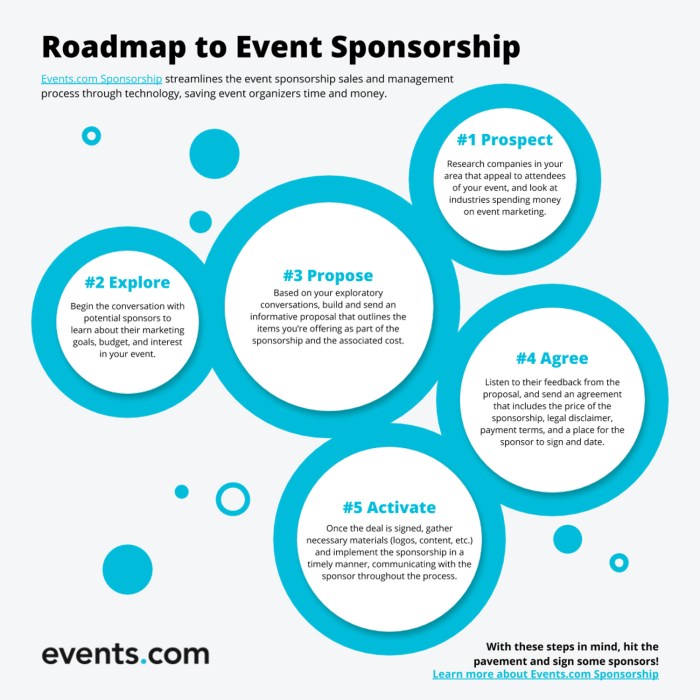Event Sponsorship Tips sets the stage for this enthralling narrative, offering readers a glimpse into a story that is rich in detail with American high school hip style and brimming with originality from the outset.
When it comes to making your mark in the world of event sponsorship, these tips will guide you towards success and help you stand out from the crowd.
Importance of Event Sponsorship: Event Sponsorship Tips

Event sponsorship is a key strategy for businesses looking to boost their brand visibility and reach a wider audience. By sponsoring events, companies can benefit from increased exposure, brand recognition, and customer engagement. Let’s dive into the benefits of event sponsorship and how it can help businesses thrive.
Benefits of Event Sponsorship
- Enhanced Brand Visibility: Event sponsorship allows businesses to showcase their brand in front of a targeted audience, increasing brand recognition and visibility.
- Customer Engagement: Sponsoring events provides a unique opportunity to interact with potential customers in a more personal and engaging way, fostering brand loyalty.
- Networking Opportunities: Events offer a platform for businesses to connect with other industry professionals, potential partners, and customers, fostering valuable relationships.
Examples of Successful Event Sponsorship Campaigns
- Red Bull Stratos: Red Bull’s sponsorship of Felix Baumgartner’s record-breaking freefall jump not only generated massive media coverage but also solidified Red Bull’s brand image as innovative and daring.
- Nike at the Olympics: Nike’s sponsorship of athletes at the Olympics not only promoted their brand but also showcased their commitment to excellence and performance.
- Coca-Cola at Music Festivals: Coca-Cola’s sponsorship of music festivals has allowed the brand to connect with a younger audience and align their brand with fun and entertainment.
Finding the Right Event to Sponsor
When it comes to finding the right event to sponsor, it’s essential to align with your brand values and connect with your target audience. Research and evaluation play a crucial role in making the best decision for your sponsorship investment.
Identifying Events that Align with Your Brand Values
To identify events that align with your brand values, consider the mission and values of the event organizers. Look for events that share similar values and goals as your brand. This alignment will help ensure that your sponsorship is authentic and resonates with the event attendees.
Researching the Target Audience of the Event
Researching the target audience of the event is key to understanding if it aligns with your customer base. Look into demographics, interests, and behaviors of the attendees to see if they match your target market. This research will help you tailor your sponsorship activation to effectively reach and engage the event attendees.
Evaluating the Potential ROI of Sponsoring an Event
When evaluating the potential ROI of sponsoring a particular event, consider factors such as brand exposure, lead generation, and sales impact. Calculate the potential reach and engagement your brand can achieve through the event sponsorship. Analyze if the event aligns with your marketing goals and objectives to determine the ROI potential.
Negotiating Sponsorship Deals
When negotiating sponsorship deals with event organizers, it’s important to approach the conversation strategically. Here are some tips to help you secure the best sponsorship package for your brand.
Key Elements in a Sponsorship Agreement, Event Sponsorship Tips
- Clearly defined deliverables: Make sure the agreement Artikels exactly what the event organizers will provide in return for your sponsorship.
- Duration of sponsorship: Specify the length of time your brand will be associated with the event to maximize exposure.
- Brand visibility: Ensure that your logo and brand messaging are prominently displayed throughout the event venue and marketing materials.
- Exclusive sponsorship rights: Negotiate exclusivity to prevent competitors from advertising at the same event.
Tips for Leveraging Added Value
- Engage with event attendees: Take advantage of networking opportunities to connect with the audience and build brand awareness.
- Offer interactive experiences: Create engaging activities or demonstrations to attract more attention to your booth or sponsored area.
- Utilize social media: Encourage event organizers to promote your brand on their social media channels to reach a wider audience.
- Collect feedback: Use the event as an opportunity to gather feedback from attendees to improve future sponsorship strategies.
Activating Event Sponsorship
When it comes to event sponsorship, just slapping your logo on a banner won’t cut it. You’ve got to activate that sponsorship to make a real impact and get the most out of your investment. Here’s how to do it:
Engaging with Event Attendees
To engage with event attendees effectively, you need to create interactive experiences that make them remember your brand. Here are some ideas to get you started:
- Set up a photo booth where attendees can take fun pictures with your brand props and share them on social media with a custom hashtag.
- Host a giveaway or contest that encourages attendees to visit your booth and interact with your brand for a chance to win a prize.
- Organize a live demonstration or workshop showcasing your products or services to educate attendees and create a memorable experience.
Creative Activation Ideas
When it comes to activating event sponsorship, the possibilities are endless. Here are some creative ideas to inspire you:
- Partner with a popular food truck to offer free snacks or drinks branded with your logo at the event.
- Create a branded lounge area with comfortable seating, charging stations, and interactive games for attendees to relax and engage with your brand.
- Sponsor a live performance or entertainment act that aligns with your brand values to create a memorable experience for attendees.
Measuring Success and ROI

When it comes to event sponsorship, measuring success and return on investment (ROI) is crucial for determining the impact of your brand’s participation. By analyzing key performance indicators (KPIs) and evaluating the overall impact, you can gauge the effectiveness of your sponsorship efforts.
Key Performance Indicators (KPIs)
Tracking specific KPIs can help you assess the success of your event sponsorship. Some key indicators to consider include:
- Brand Exposure: Measure the visibility and reach of your brand during the event through social media mentions, press coverage, and audience engagement.
- Lead Generation: Track the number of leads generated from the event and evaluate their quality to determine the impact on sales and conversions.
- Engagement Metrics: Monitor attendee interactions, feedback, and participation to gauge the level of engagement with your brand.
Tracking and Analyzing ROI
Calculating the ROI of event sponsorship involves comparing the costs incurred with the benefits gained. To track and analyze ROI effectively, consider the following:
- Cost Analysis: Evaluate the expenses associated with sponsorship, including fees, marketing materials, and staff resources.
- Revenue Generation: Measure the revenue generated as a direct result of the event sponsorship, including new sales, partnerships, and customer acquisitions.
- ROI Calculation: Use the formula:
(Revenue Generated – Cost of Sponsorship) / Cost of Sponsorship x 100
to determine the return on investment percentage.
Evaluating Impact on Brand Awareness and Sales
Assessing the overall impact of event sponsorship on brand awareness and sales involves analyzing various factors, such as:
| Brand Sentiment: Evaluate the perception of your brand before and after the event to determine any shifts in consumer sentiment. | Sales Performance: Compare sales data before and after the event to identify any spikes or trends attributed to the sponsorship. |
| Customer Feedback: Gather feedback from attendees, partners, and stakeholders to understand how the event sponsorship influenced their perception of your brand. | Market Positioning: Analyze how the event sponsorship has impacted your brand’s position in the market and among competitors. |
